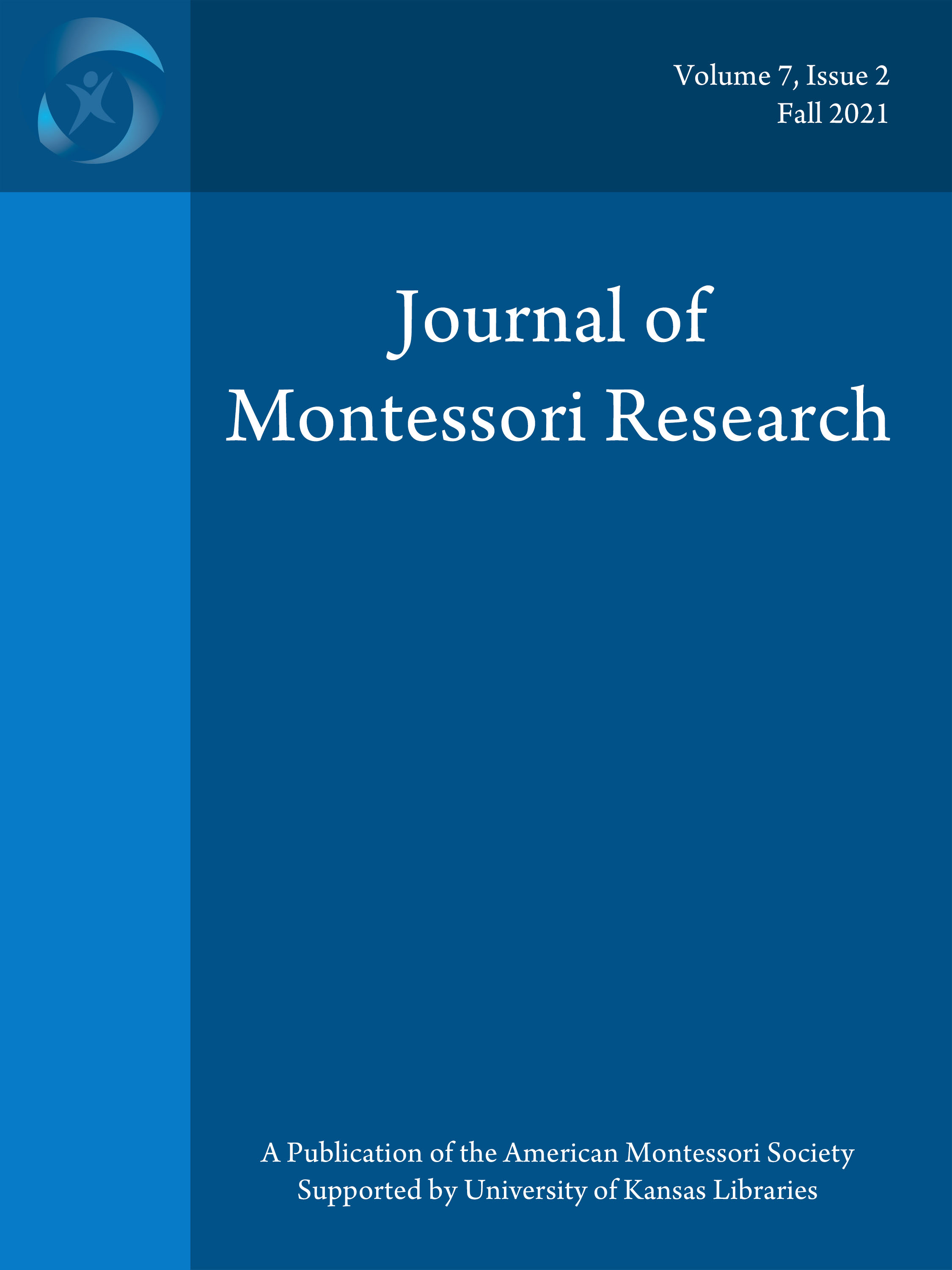Montessori Education: Teacher Perceptions of Challenges in Transitioning to Virtual Instruction
DOI:
https://doi.org/10.17161/jomr.v7i2.15469Palabras clave:
elementary, Montessori, virtual instruction, COVID-19Resumen
In 2020, Montessori teachers and families across the world had to adjust as schools were closed because of the rapid onset of the COVID-19 pandemic. Those working in the Montessori classroom, which typically favors a hands-on approach and limited use of technology, had to devise new ways to engage with students in the virtuallearning environment. How do teachers perceive that the transition to online learning affected their instruction? This descriptive case study examined the ways in which a school’s Lower and Upper Elementary Montessori teachers adjusted their instruction to meet student needs online, as well as the benefits and challenges that the teachers felt they and the students experienced as a result.
Referencias
American Montessori Society. (n.d.). Why choose Montessori? https://amshq.org/Families/Why-Choose-Montessori
Bagby, J., & Sulak, T. (2018). Montessori and executive function. Montessori Life, 30(1), 15. https://www.proquest.com/openview/ef0f6f4793c8b636935e27b52ea27b0f
Bauerlein, V. (2021, May 9). Remote kindergarten during Covid-19 could “impact this generation of kids for their lifetime.” The Wall Street Journal. https://www.wsj.com/articles/remote-kindergarten-during-covid- 19-could-impact-this-generation-of-kids-for-their-lifetime-11620552653
Cavanaugh, C., Gillan, K. J., Kromrey, J., Hess, M., & Blomeyer, R. (2004). The effects of distance education on K–12 student outcomes: A meta-analysis. https://files.eric.ed.gov/fulltext/ED489533.pdf
Cerniglia, E. G. (2011). Modeling best practice through online learning: Building relationships. Young Children, 66(3), 54–56, 58–59.
Cifuentes, L., & Prozesky, K. (2014). The Montessori approach to integrating technology. Problemy Wczesnej Edukacji, 24(1), 29–38. https://tinyurl.com/9bkukcdw
Creswell, J. (2014). Research design: Qualitative, quantitative, and mixed methods approaches. Sage Publications.
DiPietro, M., Ferdig, R. E., Black, E. W., & Preston, M. (2008). Best practices in teaching K–12 online: Lessons learned from Michigan Virtual School teachers. Journal of Interactive Online Learning, 7(1), 10–35. https://iols.gmu.edu/assets/761/Article2e.pdf
Howell, L., Sulak, T. N., Bagby, J., Diaz, C., & Thompson, L. W. (2013). Preparation for life: How the Montessori classroom facilitates the development of executive functioning skills. Montessori Life, 25(1), 14–18. http://www.childreninc.org/wp-content/uploads/2013/01/Preparation-for-Life.pdf
Hubbell, E. R. (2003). Integrating technology into the Montessori elementary classroom. Montessori Life, 15(2), 40–41.
Jones, S. J. (2017). Technology in the Montessori classroom: Teachers’ beliefs and technology use. Journal of Montessori Research, 3(1), 16–29. https://doi.org/10.17161/jomr.v3i1.6458
Kayili, G., & Ari, R. (2011). Examination of the effects of the Montessori Method on preschool children’s readiness to primary education (EJ962690). ERIC. Educational Sciences: Theory and Practice, 11(4), 2104–2109. https://files.eric.ed.gov/fulltext/EJ962690.pdf
Li, C., & Lalani, F. (2020, April 29). The COVID-19 pandemic has changed education forever. This is how. World Economic Forum. https://www.weforum.org/agenda/2020/04/coronavirus-education-global-covid19-online-digital-learning/
Lillard, A. S. (2016). Montessori: The science behind the genius (3rd ed.) Oxford University Press.
Lillard, A. S., & Heise, M. J. (2006). The early years: Evaluating Montessori education. Science, 313(5795), 1893–1894. https://doi.org/10.1126/science.1132362
Lillard, A. S., & Heise, M. J. (2016). An intervention study: Removing supplemented materials from Montessori classrooms associated with better child outcomes. Journal of Montessori Research, 2(1), 16–26. https://doi.org/10.17161/jomr.v2i1.5678
MacDonald, G. (2016). Technology in the Montessori classroom: Benefits, hazards, and preparation for life (EJ1110230). ERIC. The NAMTA Journal, 41(2), 99–107. https://files.eric.ed.gov/fulltext/EJ1112230.pdf
Murray, A. K., Brown, K. E., & Barton, P. (2021a). Montessori education at a distance, part 1: A survey of Montessori educators’ responses to a global pandemic. Journal of Montessori Research, 7(1), 1–29. https://doi.org/10.17161/jomr.v7i1.15122
Murray, A. K., Brown, K. E., & Barton, P. (2021b). Montessori education at a distance, part 2: A mixed-methods examination of Montessori educators’ responses to a global pandemic. Journal of Montessori Research, 7(1), 31–50. https://doi.org/10.17161/jomr.v7i1.151223
National Education Policy Center. (2016). Virtual schools report 2016. https://files.eric.ed.gov/fulltext/ED574701.pdf
Philips-Silver, J., & Daza, M. T. (2018). Cognitive control at age 3: Evaluating executive functions in an equi-table Montessori preschool. Frontiers in Psychology, 3(106). https://doi.org/10.3389/feduc.2018.00106
Richards, E. (2020, December 17). Students are falling behind in online school. Where’s the COVID-19 ‘disaster plan’ to catch them up? USA Today. https://www.usatoday.com/in-depth/news/edu-cation/2020/12/13/covid-online-school-tutoring-plan/6334907002/
Yin, R. L. (2003). Case study research: Design and methods. Sage Publications.
Zimmerman, B. J., & Schunk, D. H. (Eds.). (2014). Educational psychology: A century of contributions. Routledge.
Descargas
Publicado
Número
Sección
Licencia
Derechos de autor 2021 Catherine M Scott, Brooke Myers

Esta obra está bajo una licencia internacional Creative Commons Atribución-NoComercial 4.0.


